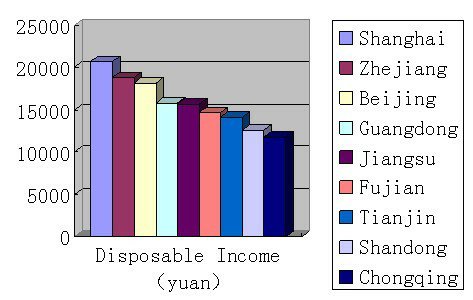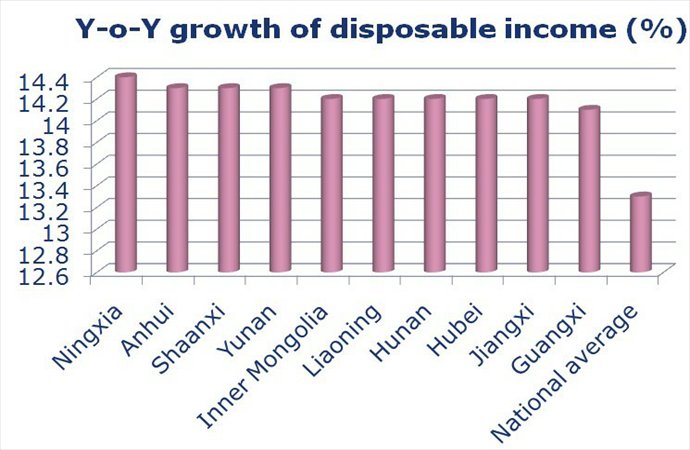HOME >> BUSINESS
Local disposable incomes of residents see growth
Source:Globaltimes.cn Published: 2012-7-30 16:53:00
| Editor's Note |
The disposable income of residents in 29 provinces, regions and municipalities including Beijing and Guangdong Province, has increased due to labor shortages and lower inflation, said experts Sunday.
But many people raise doubts over such high growth in disposable income, as China's economy has been slowing.
| Latest News |
Local disposable incomes see growth
The disposable income of residents in 29 inland provinces, regions and municipalities including Beijing and Guangdong Province, has increased due to labor shortages and lower inflation, experts said Sunday.
China's July inflation to ease further: reports
China's inflation rate is likely to fall below 2 percent in July due to the base effect, giving authorities more room to beef up monetary supply to support growth, according to the latest bank estimations.
| Statistics |
Top nine Chinese municipalities, provinces and regions with highest disposable income per capita(left) and top 10 provinces and regions experiencing greatest increase in disposable income per capita over the first half of this year


China's average disposable income was 12,509 yuan for the first half of the year, growing 13.3 percent and inflation-adjusted 9.7 percent year-on-year, according to figures from the National Bureau of Statistics.
Shanghai tops the list with average disposable income of 20,689 yuan ($3,242) for the first half of the year, followed by Zhejiang Province with 18,802 yuan, while Beijing ranks the third with average disposable income at 18,154 yuan.
Northwest China's Qinghai Province has the lowest half-year disposable income of residents who provided data, which stood at 7,848.41 yuan, growing by 11.6 percent for the first half of the year.
Economic data of major provinces, municipalities over the first half of this year
| Places | disposable income for urban residents (yuan) | disposable income growth rate (%) |
CPI growth rate (%) |
GDP growth rate (%) |
GDP volume (billion yuan) |
| Shanghai | 20,689 | 12.5 | 3.6 | 7.2 | 955.22 |
| Zhejiang |
18,802 | 11.7 | 2.9 | 7.4 | 1,579.04 |
| Beijing | 18,154 | 11.0 | 3.5 | 7.2 | 834.86 |
| Guangdong | 15,779 | 13.5 | 3.5 | 7.4 | 2,620.09 |
| Jiangsu | 15,655 | 13.9 | 3.1 | 9.9 | 2,538.28 |
| Fujian | 14,661 | 12.9 | 2.9 | 11.3 | 798.26 |
| Tianjin | 14,135 | 10.1 | 3.6 | 14.1 | 586.49 |
| Shandong |
12,627 |
13.8 |
3.0 | 9.2 | 2,411.81 |
| Chongqing |
11,760 |
13.3 |
3.6 | 14.0 | 530.72 |
| Qinghai |
7,848 |
11.6 |
1.9 |
12.3 |
79.76 |
| National average | 12,509 |
13.3 |
3.3 |
7.8 |
22,709.8 |
Source: National Bureau of Statistics and local statistics authorities
Illustrations: Globaltimes.cn
| Comments |
Many people raise doubts over such high growth in disposable income, as China's economy has been slowing. The GDP growth fell to 7.6 percent in the second quarter from 8.1 percent in the first quarter.
According to a survey conducted by business portal hexun.com, 61.54 percent of the respondents said their disposable income failed to reach the local average, and 80.7 percent believed that the income statistics are not credible.
Chen Naixing, a researcher with the Chinese Academy of Social Sciences
"Due to a shortage of labor, a rise in wages in many places contributed to the high growth of disposable income."
Yin Chengji, a spokesman with the Ministry of Human Resources and Social Security
By the end of June, a total of 16 provinces and municipalities had raised the minimum monthly salary by an average 19.7 percent.
Wang Xiaoguang, a researcher with the Chinese Academy of Governance
The disposable income growth should not be as high as reported if the figures are adjusted against inflation.
The inflation-adjusted disposable income growth in Shanghai and Beijing is only about 8.6 percent and 8 percent respectively, according to local statistics authorities. Lower inflation this year has strengthened consumer's purchasing power, Wang said.
Internet Voices
@筱筱: The only thing I feel is the soaring prices, not an increase in income. These numbers don’t reflect our reality.
@刘万红: I really don’t know how they got this data. All I can tell is that my income is lower than before.
@韩伟: If a person earns more, his standard of living improves. But if everyone’s income increases at once, things may get even worse than they are now.
@酱油弟工坊: Shaanxi province may have the lowest average income, but they have more disposable income. On the contrary, Beijing boasts the highest average income but not the highest disposable income. So there’s no sense in talking about overall income increases.
| Related Biz Reports |
 |
 |
 |
 |
 |
Newspaper headline: Disposable incomes of residents see growth
Posted in: Economy